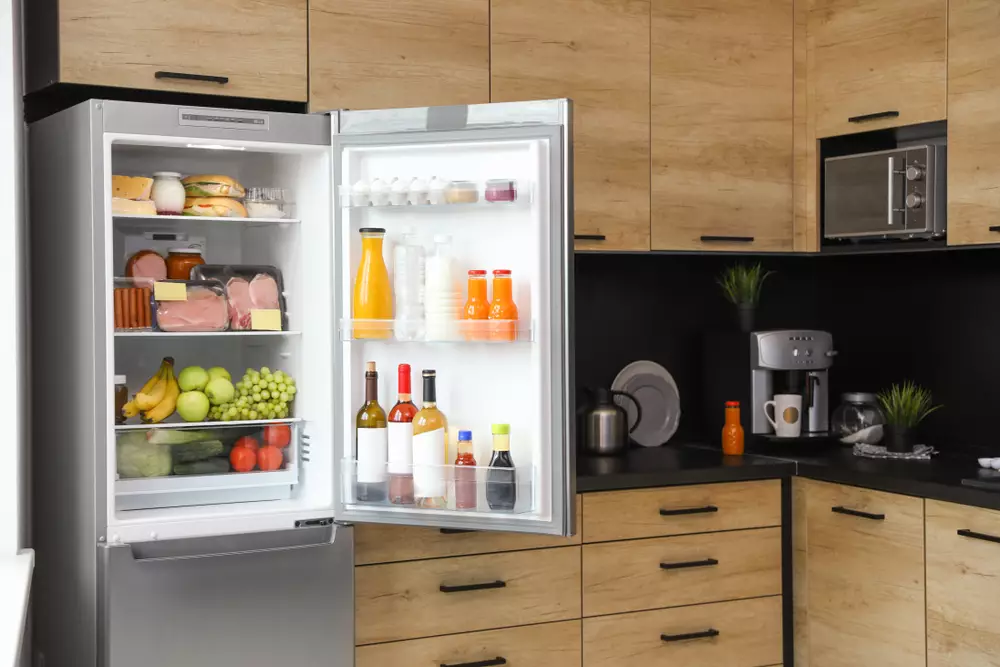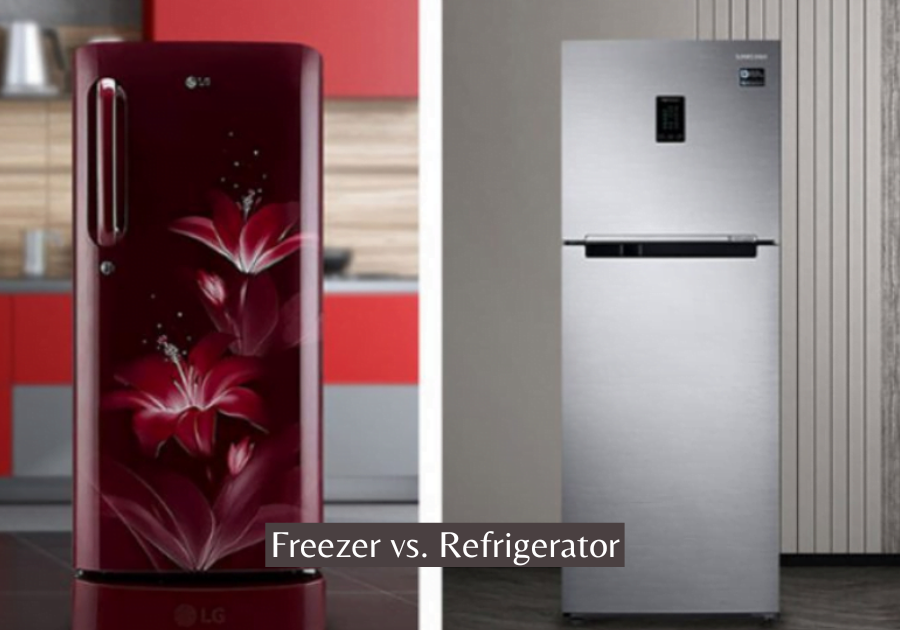When it comes to preserving food and extending its shelf life, refrigerators and freezers are indispensable appliances in the modern home. These appliances not only help keep food fresh for longer periods, but also save us time and money by allowing us to store leftovers, bulk purchases, and seasonal produce.
However, with so many options available in the market, it can be overwhelming to decide which appliance is right for you. In this article, we will explore the differences between Freezer vs. Refrigerator, and help you determine which one is the best fit for your needs.
What is a Refrigerator?
Refrigerators are designed to keep fresh food at the optimal temperature, which helps preserve its quality and extend its shelf life. They are a great option if you eat a lot of fresh food, such as fruits, vegetables, and dairy products.
Refrigerators come in a variety of sizes and styles, from compact models that fit in small spaces to large French door models with plenty of storage space. They typically have multiple shelves and compartments, which can be adjusted to fit different types of food.
A refrigerator is an appliance that keeps food at a temperature between 35 °F and 38 °F (1.6 °C and 3.3 °C). This temperature range slows down the growth of bacteria and other microorganisms that cause food spoilage and helps preserve the nutritional content of the food.
What is a Freezer?
Freezers, on the other hand, are designed specifically for storing frozen food. They can keep food at a much colder temperature than refrigerators, which helps prevent freezer burn and other types of food spoilage.
One of the main benefits of freezers is their ability to store food for long periods of time. Frozen food can be stored for months without losing its quality or nutritional value. Freezers also provide more storage space for frozen food than refrigerators, so they are a great option if you buy food in bulk or like to meal prep.
A freezer is an appliance that keeps food at a temperature of 0 °F (-18 °C) or lower. This temperature range halts the growth of bacteria and other microorganisms and preserves the quality and flavor of the food.
Freezers come in various sizes and types, including chest freezers, upright freezers, and refrigerator-freezer combinations. They also come with features such as adjustable shelves, frost-free technology, and temperature alarms.

Differences Between a Freezer and a Refrigerator
While both appliances are designed to store food and extend its shelf life, there are some key differences between freezers and refrigerators that you should be aware of before making a purchase.
Temperature Range
The main difference between a freezer and a refrigerator is the temperature range. While a refrigerator keeps food at a temperature between 35 °F and 38 °F (1.6 °C and 3.3 °C), a freezer keeps food at a temperature of 0 °F (-18 °C) or lower.
Storage Capacity
Freezers generally have a larger storage capacity than refrigerators. This is because frozen food takes up less space than fresh food, and freezers can be designed to maximize storage space.
Types of Food
Refrigerators are designed to store fresh food, such as fruits, vegetables, dairy products, and meats. Freezers, on the other hand, are designed to store frozen food, such as frozen vegetables, fruits, meats, and pre-packaged meals.
Energy Efficiency
In general, refrigerators are more energy efficient than freezers. This is because refrigerators are designed to maintain a constant temperature, whereas freezers have to work harder to maintain a lower temperature.
Price
Freezers are generally more expensive than refrigerators, especially if you opt for a larger size or more advanced features. However, this can vary depending on the brand, model, and type of appliance.
Freezer or Refrigerator: Which is More Energy Efficient?
When it comes to energy effectiveness, refrigerators are generally more effective than freezers. This is because refrigerators are designed to maintain temperatures that are slightly above freezing, while freezers must maintain temperatures well below freezing.
In general, a freezer uses further energy than a refrigerator to achieve and maintain its lower temperature. Still, it’s worth noting that the energy effectiveness of both appliances can vary extensively depending on several factors, including the age, size, and model of the appliance, as well as how frequently it’s opened and how it’s used.
To ensure that your freezer or refrigerator is operating as efficiently as possible, it’s important to keep it well-maintained. This means drawing the coils regularly, icing that the door seals are tight, and keeping the appliance grazed but not overfilled. Also, investing in a newer, more energy-effective model can help to reduce your energy consumption and save you plutocrats on your energy bills over time.
Freezer vs. Refrigerator: Which One Should You Choose?
When it comes to choosing between a freezer and a refrigerator, your decision will ultimately depend on your specific lifestyle and needs. Here are some factors to consider when deciding which appliance is right for you:
- Food Storage: Do you typically cook and eat fresh meals, or do you frequently rely on frozen meals? If you need to store a lot of frozen food, a freezer is likely the better choice. However, if you prefer fresh food or only need to store small quantities of frozen items, a refrigerator may be sufficient.
- Available Space: How much space do you have in your kitchen for a new appliance? Freezers typically take up more space than refrigerators, so if you have limited room, a refrigerator may be the better choice.
- Energy Efficiency: Are you concerned about energy usage and your environmental impact? As mentioned earlier, refrigerators are typically more energy-efficient than freezers, so if you’re looking to minimize your energy consumption, a refrigerator may be the better choice.
- Budget: How much are you willing to spend on a new appliance? Freezers can be more expensive than refrigerators, particularly if you need a large-capacity model. If budget is a concern, a smaller refrigerator may be the more affordable option.
- Lifestyle Habits: How often do you cook and shop for groceries? If you’re someone who shops for groceries once a week and cooks large meals to last throughout the week, a larger freezer may be a good fit for your lifestyle. However, if you prefer to shop for fresh ingredients on a daily basis, a refrigerator may be more suitable.
How to Maintain Your Freezer and Refrigerator
Proper maintenance and upkeep are essential for keeping your freezer and refrigerator running efficiently and extending its lifespan. Here are some tips for managing your appliances:
- Clean the Coils: The coils on the back of your refrigerator or freezer can accumulate dust and debris over time, reducing efficiency and increasing energy usage. It’s important to clean the coils regularly using a brush or vacuum.
- Check the Door Seals: The door seals on your appliance help to keep cold air inside and prevent warm air from entering. If the seals are loose or damaged, your appliance will have to work harder to maintain its temperature. Check the seals regularly and replace them if necessary.
- Defrost Your Freezer: If you have a manual-defrost freezer, it’s important to defrost it regularly to prevent ice buildup. Too much ice can reduce the appliance’s efficiency and shorten its lifespan. Follow the manufacturer’s instructions for defrosting your freezer.
- Keep the Appliance Stocked but Not Overfilled: A well-stocked refrigerator or freezer is more efficient than an empty one, as the food helps to retain cold temperatures. However, overfilling the appliance can reduce airflow and lead to inefficient cooling.
- Keep the Temperature Settings Optimized: Your appliance’s temperature settings can have a big impact on its energy usage. Keep your refrigerator at around 37-40 °F (3-4 °C) and your freezer at around 0 °F (-18 °C) for optimal efficiency.
- Regularly Check for Maintenance Issues: Keep an eye out for any signs of maintenance issues, such as leaks, strange noises, or uneven cooling. Address these issues promptly to prevent further damage to your appliance.
Conclusion
Both freezers and refrigerators play important roles in keeping our food fresh and safe to consume. While refrigerators are designed to maintain the freshness of food items for a short period of time, freezers are meant for longer-term storage by freezing food at a much lower temperature.
Refrigerators are ideal for storing fresh produce, dairy products, and leftovers, while freezers are perfect for preserving meat, fish, and other perishable items for extended periods of time. However, it’s worth noting that not all foods can be frozen and thawed without losing their quality and taste.
Regardless of which appliance you choose, it’s important to use them properly and maintain them regularly to ensure the longevity of the food stored in them.
